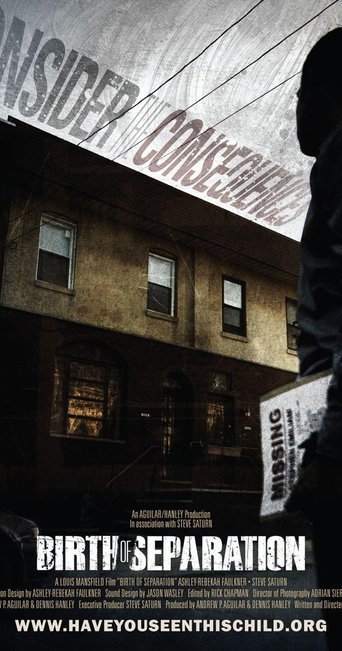

Louis Mansfield's Birth of Separation is a grueling and painful experience of deeply tragic storytelling. The film recently sold-out it's debut screening at the Ritz Bourse in Philadelphia, PA, on June 17, 2010, an event highly anticipated within the local independent film community. In a short speech before the screening, producer Dennis Hanley gently remarked, "We wanted to show everyone that to make a great film, you don't need tons of money, you need to work hard to cultivate an idea." There are, of course, many other films more polished, more sleek, and more generously funded than Birth of Separation, but the idea central to this story is carefully unfolded, thoughtfully actualized, and profoundly powerful.Throughout the screening, audience members would periodically attempt laughter in defense of the films shocking brutality. There is, in fact, very little to laugh at in this movie. We were watching a home invasion scenario, an event which is most often random and senseless. Jerome (Steve Saturn) is a psychopath who is victimizing Elizabeth (Ashley-Rebekah Faulkner), a pregnant woman. He's evil, she's in peril. Eventually, the fully disclosed facts of their situation impose an insoluble, ethical imperative upon the viewer. We are moved to accept that nothing else could have happened, other than what plays out before us, and that both characters exist progress towards unspeakable horror and loss. In this way, Birth of Separation is marked by it's adherence to the function of classical Athenian tragedy, in which audiences were meant to endure and affirm the limits of human suffering in the reception of a performance.1Ancient tragedy differs from modern tragedy in that everyone involved is doomed from the outset. In modern tragedies, characters are accountable for their actions. They may work themselves out of trouble, and things may even end "happily ever after" for some. Ancient tragedies unravel into complete oblivion; they begin with conditions which are ruined towards an end. In this film, we learn that what Jerome is doing to Elizabeth is not an act of pure cruelty -- This would imply that he has no motive except to enact violence for its own sake. He is seeking revenge of a special kind. Without further revelation: Jerome cannot be, his very existence is not permitted in the world, and Elizabeth is and will always be the reason for this fact.Each element of the film successfully draws us closer to the tragedy which is unfolding. Lead parts, played by Steve Saturn and Ashley-Rebekah Faulkner, are carefully calculated and skillfully executed. Jay Wasley contributes a score which oscillates between sparsely minimal textures and warmly resonant sound-scapes (featuring some especially good cello-playing).In short, the film is well-crafted, complete, and ought to become available to a wider audience soon.1The basis for this argument can be found in both Friedrich Nietzsche's The Birth of Tragedy and Søren Kierkegaard's essay "Ancient Tragedy's Reflection in the Modern" from Either/Or.
... View MoreFew movies disturb and unsettle me. Birth of Separation manages to do both. With unflinching and unrelenting tension, suspense, and violence, this film manages to get inside your mind and lodge itself there, making you think, making you flinch, making you fear what will come next. And it does not accomplish this with special effects, schlocky gore, or over-the-top plot twists; it accomplishes it through a well-written script, believable characters, and an actor and actress who both are convincing in their roles.Do what you must to see this film, and remember the names of those involved in making it and of those who star in it; you will see those names again, and when you do, you can say you knew them when.
... View More